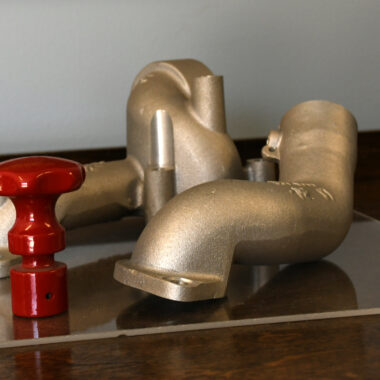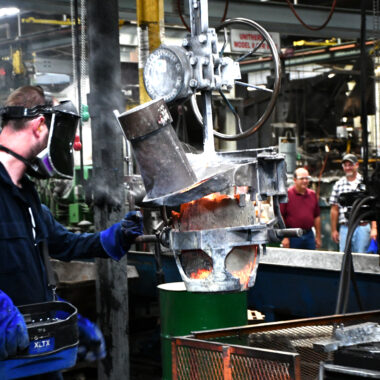Accuracy in Practice: The Art About Aluminum Casting
Accuracy in Practice: The Art About Aluminum Casting
Blog Article
Crafting Perfection: Just How to Attain High-Quality Light Weight Aluminum Castings Every Single Time
In the world of light weight aluminum spreading, the quest of perfection is a continual trip that needs a precise method and a keen understanding of the details entailed. Accomplishing consistent top quality light weight aluminum spreadings requires a detailed grasp of the procedures, from choosing the suitable alloy to executing exact mold layouts and thoroughly controlling casting criteria. The true proficiency lies in the capacity to execute these components perfectly to create perfect spreadings every time. As we explore the details of crafting perfection in light weight aluminum castings, discovering the vital techniques and strategies that result in impressive results ends up being paramount for those aiming for quality in this specialized field.
Understanding Aluminum Casting Processes
Aluminum casting processes, necessary in the production sector, involve the intricate makeover of liquified aluminum right into strong kinds through a series of carefully regulated actions. Recognizing these procedures is extremely important to achieving premium aluminum castings consistently - about aluminum casting. The primary methods used in light weight aluminum spreading are die casting, sand casting, and financial investment spreading

Each of these processes has its advantages and is selected based on elements like complexity, volume, and desired finish of the aluminum casting. about aluminum casting. Understanding the complexities of these techniques is vital for suppliers intending to generate high-grade light weight aluminum spreadings continually
Selecting the Right Light Weight Aluminum Alloy
Picking the suitable light weight aluminum alloy is a crucial choice in the production of top notch aluminum castings. When picking an aluminum alloy for spreading, it is essential to think about the details needs of the application to make certain optimum efficiency.
One of the most typically utilized aluminum alloys for casting is A356 - about aluminum casting. For applications needing high stamina, 7075 light weight aluminum alloy is a prominent option due to its outstanding strength-to-weight proportion.
In enhancement to mechanical buildings, factors to consider such as price, schedule, and post-casting procedures need to additionally affect the choice of the ideal light weight aluminum read more alloy. By very carefully examining these aspects, makers can make sure the production of premium aluminum castings that fulfill the wanted requirements.
Carrying Out Appropriate Mold Design
Creating a reliable mold design is crucial for making certain the effective manufacturing of premium aluminum spreadings. Correct mold design plays a significant duty in attaining the preferred characteristics of the last item. To execute a successful mold and mildew style, factors such as product flow, cooling down rates, and component geometry need to be thoroughly taken into consideration.
One secret aspect of mold and mildew design is making certain appropriate dental filling and solidification of the aluminum within the mold and mildew tooth cavity. This entails creating jogger and gating systems that assist in smooth metal flow and protect against flaws such as air entrapment or incomplete filling. In addition, integrating air conditioning channels right into the mold style aids control solidification prices and decrease the threat of porosity or shrinkage flaws.

Controlling Spreading Parameters

Making Sure Post-Casting High Quality Checks
To preserve the high top quality of light weight aluminum spreadings, comprehensive post-casting high quality checks are crucial. After the casting process is completed, it is vital to ensure that the final items meet the desired criteria and requirements.
Dimensional precision is an additional essential aspect that should be confirmed throughout post-casting high quality checks. Dimensions of crucial measurements and resistances need to be required to validate that the spreadings adapt the required requirements. In addition, mechanical residential properties such as solidity, tensile stamina, and effect resistance may need to be assessed through material testing to ensure that the castings have the essential toughness and toughness learn the facts here now for their desired application.
Final Thought
Finally, accomplishing premium aluminum castings calls for a thorough understanding of the spreading procedures, choosing the appropriate alloy, designing check it out mold and mildews successfully, managing casting criteria thoroughly, and conducting post-casting top quality checks faithfully. By complying with these steps, producers can regularly generate light weight aluminum castings that fulfill the greatest standards of top quality and performance.
Attaining constant top quality light weight aluminum castings requires a detailed grasp of the procedures, from selecting the proper alloy to performing precise mold and mildew designs and diligently managing spreading parameters. The key techniques made use of in light weight aluminum casting are pass away casting, sand casting, and financial investment spreading.
Investment casting, additionally understood as accuracy casting, includes creating wax patterns that are coated in ceramic to create molds.Choosing the appropriate aluminum alloy is a crucial choice in the manufacturing of premium light weight aluminum castings.Making sure specific control over casting specifications is necessary for maintaining consistency and high quality in light weight aluminum casting production.
Report this page